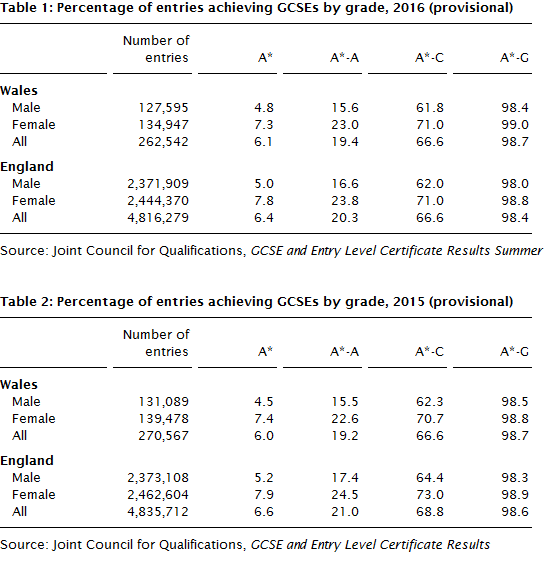Today students in Wales, England and Northern Ireland receive their GCSE results.
As with last week’s A level results, the Joint Council for Qualifications (JCQ – a membership organisation of the seven largest providers of qualifications in the UK) publish summaries of the results [PDF 668KB]. The JCQ data shows the collective results of the entries of the member awarding bodies.
These results are for those learners who took examinations in June 2016. Policy changes in England, have meant there are fewer learners who enter exams earlier than the Summer. While the previous Minister for Education and Skills, Huw Lewis expressed concerns about the increasing numbers of pupils taking their exams early, there has been no policy change on early entry in Wales.
Results
The data in the tables below compare results for 2015 and 2016. This comparison is made based on the data published by JCQ on GCSE results day in 2015.
Data is provisional representing the position at the time that results are issued.
Data is subject to checking before final data at Wales, local authority and school level is published. The results published by the JCQ relate to ‘entries’ and not to ‘candidates’. So, for example, the data can show that performance has increased or declined at GCSE or within the grades. It cannot show whether more boys or girls achieve five or more grades A*-C at GCSE. The data relates to the outcome of the individual subject areas for all regardless of their age.
Comparison between 2015 and 2016
- In Wales, male learners achieving grades A*-C has decreases by 0.5 percentage points while the percentage of females achieving grades A*-C increased by 0.3 percentage points. The percentage of all learners achieving A*-C remained the same as in 2015 and is now the same as in England;
- The overall pass rate (A*-G) for females has increased by 0.2 percentage points. The overall pass rate has decreased for males by 0.1 percentage points. It remains the same as last year for all learners;
- There has been an increase in the number of males achieving grade A* of 0.3 percentage points, with a slight decrease of 0.1 percentage points for females. There is an increase at this grade for all learners of 0.1 percentage points;
- This year there have been increases for those achieving grades A*-A, 0.1 percentage points for males, 0.4 percentage points for females and 0.2 percentage points for all learners;
- In England there have decreases at all grades. At grades A* there were decreases for males, females and all learners of 0.2 percentage points, 0.1 percentage points and 0.2 percentage points respectively);
- At grades A*-C there were decreases for males of 2.4 percentage points, females of 2 percentage points and all learners of 2.2 percentage points.
Males and females
- Girls continue to achieve better results than boys at all levels in Wales and England;
- In Wales, the gap has decreased at grade A*but increased at all other grades. In England, the gap increased at all grades.
Wales and England
Tables 1 and 2 show the percentage of entries in all subjects by grade for Wales and England for 2015 and 2016. Comparisons between results in Wales and England should be treated with caution as increasing divergence in policy makes such comparisons difficult. (See this Welsh Government guidance note.)
In addition to the change in policy in England discouraging schools from entering candidates early where they are not fully ready, there have been other changes in entry patterns in England including making it compulsory for students to retake GCSEs in Maths and English where they achieve lower than a grade C. Note also that the JCQ results only include the summer series.
They do not include any early entries in the winter or re-sits and this can have a distorting effect on comparisons, particularly where more able pupils are entered early. At grades A* and A*-A, learners in England performed better than those in Wales. However, the gap in performance has narrowed since 2015.
At grades A*-C, males in England achieved better results than those in Wales (by 0.2 percentage points) but females and all learners achieved the same (71 per cent and 66.6 per cent) in Wales and England. At grades A*-G, males, females and all learners in Wales performed better than those in England (by 0.4 percentage points 0.2 percentage points and 0.3 percentage points respectively). 
Welsh Baccalaureate
The results of the Intermediate and Foundation Baccalaureate are also published today.
At Foundation Level, 92.5 per cent per cent of candidates were awarded the Core Certificate, compared with 86.7 per cent in 2015. 90.3 per cent of candidates were awarded the Diploma compared with 85 per cent last year. At Intermediate Level, 93.8 per cent of candidates were awarded the Core Certificate compared with 89.4 per cent in 2015 and 82.6 per cent per cent of candidates were awarded the Diploma compared with 82.2 per cent in 2015.
Article by Sian Hughes, National Assembly for Wales Research Service






